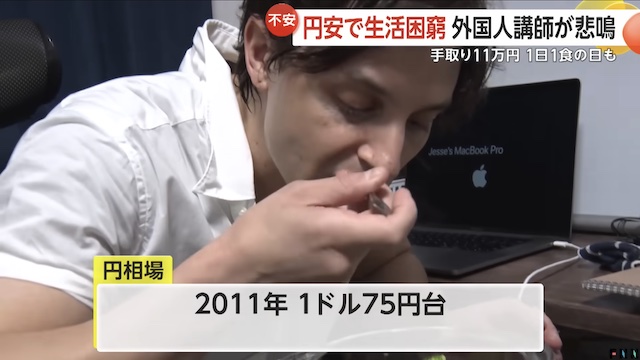KANAGAWA, Jul 21 (News On Japan) - A 43-year-old American male, who has been teaching English at elementary and junior high schools in Kanagawa Prefecture for 18 years, is voicing his struggles with living expenses.

Jesse Ali: 'This shirt (from a thrift store) was 500 yen. Everything on the wall is also 500 yen. When the supermarket has discounts, I buy expired items at 20% off and store them in the freezer.'
On the 19th, the Japan National Tourism Organization announced that the number of foreign tourists visiting Japan in the first half of 2024 reached a record high of approximately 17.78 million. Additionally, the amount spent by foreign tourists in Japan from April to June totaled about 2.1 trillion yen, marking a record high for any quarter, fueled by the historically weak yen.
The spending per foreign tourist amounted to 239,000 yen, and if this pace continues in the second half, the total consumption could reach 8 trillion yen.
Meanwhile, some foreigners who have lived in Japan for many years are also expressing their financial difficulties.
Jesse Ali, a 43-year-old from California, works as an Assistant Language Teacher (ALT), teaching English conversation classes at elementary and junior high schools.
Jesse works five days a week, with a monthly take-home pay of around 180,000 yen. However, his take-home pay decreased to about 76,000 yen in March due to the spring break and was about 110,000 yen in April.
Jesse lives in a share house with shared bath, toilet, and kitchen facilities, paying 83,000 yen including utilities. March was a deficit month for him.
Jesse Ali: 'I like the company. It's a good company, but the salary is insufficient. I want them to raise the wages.'
He cuts down on food expenses, eating only one meal a day, sometimes relying solely on school lunches.
In 2011, five years after Jesse started working in Japan, the yen exchange rate reached 75 yen per dollar. However, in 2024, it surpassed 160 yen at one point, marking a significant depreciation of the yen.
Jesse Ali: 'The yen was strong back then. It was easy to repay university loans and debts. Sending a small amount of money to the U.S. covered my monthly payments. But as the yen weakened, I've really been struggling with money.'
Jesse, who also has debts, plans to take on a side job to increase his income in the future.
Source: FNN















